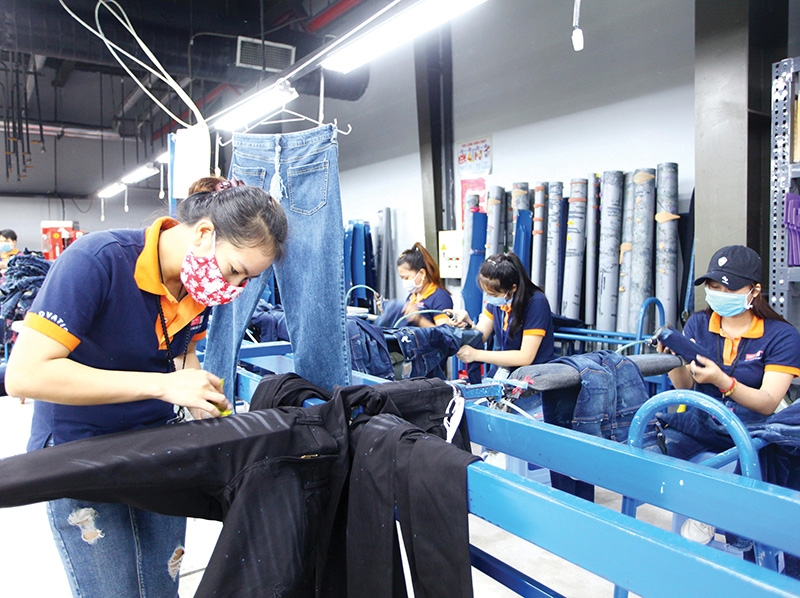Pandemic woes add to ditched FIE rise
 |
| Enterprises that make popular products for export have been at risk of collapse due to restrictions. Photo: Le Toan |
On February 17, hundreds of workers of China’s Delancey Street Furniture Vietnam Co., Ltd. in the southern province of Binh Duong’s Ben Cat district went to work as usual only to find that the company had shut down without notifying them. Nearly 350 workers became unemployed in an instant right after the national Lunar New Year holiday, following the company’s dissolution decision.
A Delancey representative said that the company had announced the dissolution on February 6. However, workers were off for the holidays so the company could not notify all of them.
As the incident affected many people, Binh Duong Labour Confederation required the company to follow proper dissolution procedures in accordance with the law. The company should pay wages to all workers until there was an official decision to terminate their contracts according to the regulations.
The leader of Binh Duong Labour Confederation added that local authorities have also instructed Delancey to follow the dissolution procedures. The company pledged to pay wages and other benefits for employees during the time of work suspension. Fortunately for some, Dai Loc Shoe Corporation in the same locality has declared itself willing to hire Delancey’s workers.
The case has raised concerns about the sudden disappearance of owners of foreign-invested enterprises (FIEs) while still owing wages and social insurance to their workers, which has plagued some localities in recent years.
In 2018, the owner of KaiYang Vietnam Co., Ltd., based in the northern city of Haiphong, ran away from a bank debt of more than VND150 billion ($6.5 million) and caused more than 2,000 workers to suddenly lose their jobs after just one day.
In the same year, the leader of Metacor VN Co., Ltd. went away from its factory in Phu My I Industrial Park in the southern province of Ba Ria-Vung Tau, leaving workers with unpaid social insurance and tax and bank debts of nearly VND150 billion ($6.5 million).
Other cases involving Lifepro Vietnam, Kenmark, Ado Vina, Amanda, and Quatron Steel all left labourers tens of billions of VND in debt.
According to Ho Chi Minh City Labour Confederation, during 2013-2018 a dozen FIEs went bankrupt and their owners fled, affecting 3,500 workers, mainly concentrated in textile and garment enterprises funded by South Korean, Taiwanese, and Japanese investors.
Vo Van Hoan, Vice Chairman of Ho Chi Minh City People’s Committee, said that due to shrinking orders, many businesses have had to scale down production activities.
He said that the city has so far recorded two labour disputes related to one FIE and one domestic enterprise in Cu Chi Industrial Zone with a total of 570 participants due to lower Lunar New Year bonuses. The employees requested the enterprise to pay an equal bonus to 2020. The city addressed the disputes through negotiation before the national holiday.
Financial analysis by the Ministry of Finance by the end of 2020 showed that almost 55 per cent of FIEs recorded losses in 2019. Some in sectors like metallurgy, gas and oil, telecommunications, and software development have recorded losses for two consecutive years.
Tran Thi Thanh Ha, deputy head of the Labour Relation Department under the Vietnam General Confederation of Labour, said that the government has issued a circular guiding these issues but it has yet to come to life. Above all, the Law on Enterprises does not include a concept of “runaway business owners”.
“It is necessary to simplify administrative procedures when enterprises carry out dissolution dossiers, as well as improve the efficiency of investment supervision,” Ha said.
What the stars mean:
★ Poor ★ ★ Promising ★★★ Good ★★★★ Very good ★★★★★ Exceptional
Related Contents
Latest News
More News
- Japanese business outlook in Vietnam turns more optimistic (January 28, 2026 | 09:54)
- Foreign leaders extend congratulations to Party General Secretary To Lam (January 25, 2026 | 10:01)
- 14th National Party Congress wraps up with success (January 25, 2026 | 09:49)
- Congratulations from VFF Central Committee's int’l partners to 14th National Party Congress (January 25, 2026 | 09:46)
- 14th Party Central Committee unanimously elects To Lam as General Secretary (January 23, 2026 | 16:22)
- Worldwide congratulations underscore confidence in Vietnam’s 14th Party Congress (January 23, 2026 | 09:02)
- Political parties, organisations, int’l friends send congratulations to 14th National Party Congress (January 22, 2026 | 09:33)
- Press release on second working day of 14th National Party Congress (January 22, 2026 | 09:19)
- 14th National Party Congress: Japanese media highlight Vietnam’s growth targets (January 21, 2026 | 09:46)
- 14th National Party Congress: Driving force for Vietnam to continue renewal, innovation, breakthroughs (January 21, 2026 | 09:42)

 Tag:
Tag:




















 Mobile Version
Mobile Version